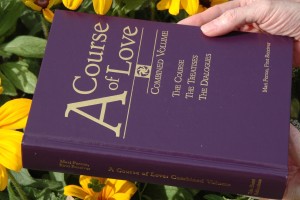 A gift has been given. What is your response? T1:2.15
A gift has been given. What is your response? T1:2.15
When we are young, being highly sensitive is seen as a liability. Well . . . this often doesn’t get much better as we mature! Sensitivity can be felt like something waiting to bring us down.
There was a boy in my grade school, Walter, whom I’ve wondered about from time to time. He would turn very red in the face over reasons that weren’t ever clear to me, and from time to time he would explode, as in a fit of temper. I always felt bad for him, certain he couldn’t help himself.
I thought of him this morning because I am prone to say “My sensibilities changed after A Course of Love.” My senses, you might say, were heightened. And I felt, often, about as frail and exposed as Walter. Noise began to bother me tremendously. My sensitivity to sights, sounds, touch—my sensitivity to stimulation—all were greater.
Think of the term “incoming” used for a flight of bomber pilots! There can be a feeling of being bombarded! Incoming! And so the need for “less” begins to arise.
I have thought of this, I’m guessing, due to my work recording the audio of the Treatises. There’s a lot in them about response, and response and sensibilities are surely linked. Heightened sensibilities are, in effect, a different level of responsiveness to what goes on around you and within you. This can often leave us feeling vulnerable.
When I speak of being vulnerable, a word I have associated with this susceptibility, I am at times reminded that vulnerability has to do, etymologically, and popularly, with wounds. Accepting and sharing our woundedness seems to me a sure way to both intimacy and relief—a way of transformation really. Wounds accepted and shared so readily become wisdom and strength and solace.
But today I want to speak more of sensitivity. You and I “receive” not only this Course, but begin to “receive” the world around us newly. We are aware of transmissions, impressions, messages and signs. You and I are “affected” to a greater degree than we once were. There are new influences and hosts of new feelings. We have a responsive relationship to unity and are in a responsive relationship with unity.
The idea I am trying to open to you here is the idea of a responsive relationship with unity that does not exist only within the mind of the wholehearted. It is the visible world, the outer world, through which your wants find provision. It is the world of unity, the true reality, through which your desires are responded to. This does not mean that the place of unity is a place that does not interact with the place of form. It is interacting with the world of form through you. Do you not see? You are the entry point, the only channel through which all that is available in unity can flow. D:Day 3.41-43
The Treatises offer a wonderful prelude to this new state, especially as response and responsibility are contrasted:
Response is given and thus genuine. It is a natural act of giving and receiving as one. Responsibility is a demanded response, a necessary response, an obligation. Response happens from within. Responsibility is all about dealing with an outside world. While both may result in the same or similar actions does not negate the need for the difference to be realized. Charity is a responsibility. Love is a response. See you not the difference? Can a father not be guided by responsibility and still fail to give love? Can a dancer not struggle mightily to perfect her talent without experiencing its joy? T1:4.13
 In becoming more sensitive (Alert? Awake? Aware?) staying away from the idea of “responsibility,” and sticking with the idea of response and responsiveness is essential.
In becoming more sensitive (Alert? Awake? Aware?) staying away from the idea of “responsibility,” and sticking with the idea of response and responsiveness is essential.
Unlike with the young Walter, our sensitivity doesn’t have to be a source of shame or lead to fits of temper. Sensitivity asks for a new response. It takes some “care” really. Some self-care. Some listening in. It is a gift, and our gifts have to be accommodated as well as appreciated if they’re going to enter that zone of giving and receiving as one. Recognizing our responsiveness is often a time of realizing that what comes to us from unity can’t be figured out—something that at first feels very odd indeed, and one of the reasons for the primacy given the “end of learning” in ACOL. If “figuring it out” continues to be our way, we will not sustain our new state of being.
Responsiveness dead-ends “figuring it out” as well as interpretation, and leads to true expression of who we are.
A response is not an interpretation. A response is an expression of who you are rather than of what you believe something else to be. . . . Response reveals the truth to you because it reveals the truth of you. (emphasis mine) T1:4.18
Let’s welcome all the new ways the “incoming” arrive and accept our ways of responding with care and love.


Thank you Mari and Paula. I realize that I have always tended to reach the core of things and people and to try do it with less words. And maybe in this I’m not as effective as I would like to be. My numerous years in advertising did have an effect on this idea of ‘in a few words’.
I think that I also said that I’m more of an essay writer or a poetic writer as opposed to a novel writer. Fewer words, less descriptions. And maybe that makes me appear or be a less intimate writer or person.
But intimacy is very important to me . And I’m ready to do what is needed to be more intimate.
Love,
Hello Paula, I love finding you here and getting the chance to explore a topic like this. “My sensibilities” having changed, was simply the way it came to me when this first started happening many years ago. Back then it felt weird and seemed to call for changes in my life that I didn’t immediately know how to bring about. When I threw in words like “awake” and “aware” in this post, I was kind of wondering if this heightened sensibility is what some mean by those words. I don’t really know. This is one of the many things I like about the way we share our experience. This is the way mine came to me and it spoke to you. Oh, yes, and I recognize the fleeing of over-stimulating situations. For me it’s been going on so many years that I’m living with it more easily. And I’m taking care of myself more. That is one of those last frontiers, isn’t it? Treating ourselves with the care we so freely offer to others? But then the discovery, that I feel you’re getting at with the quote you include of the “everything” that is given to us. ..and asked of us. Like it’s all of the same piece, the loop of giving and receiving. Thanks for that, and all the love you send out and are.
Mari, this post is so full of power and wisdom. I’ve been living with ACOL now for 1 3/4 years, intensely. I’ve read it through maybe 8 times and re-read portions many more times that this. Mari, the truths that have been opened to me through this commitment are having a profound effect on my inner world, which manifests in my outer world. You write of your senses being heightened, and your increasing sensitivity to noise, sights and sounds.
You speak of the need for less. Yes from a certain perspective. My whole life has changed and continues to change. I haven’t turned on my TV since mid-December for some Christmas programming. The last play I went to, I had to walk out of, it was so overwhelming— “West Side Story.” I haven’t gone to a movie in over a year. And on and on. T4:12.36 “Make no mistake that what is asked of us is everything. What is asked is our total willingness to abandon the old. Our total willingness to embrace the new. But also make no mistake that what is given to us is Everything.” And this is what is happening now. I am slowly recognizing the “Everything” that is being given to us. It’s a process. I love it!!! And I love you! Paula
I’ve been interested in intimacy for a very long time, but somehow I’m not sure that I’ve found the way to be truly intimate, as I read your post this morning Mari – and I read it in this light – I was intrigued with the world sensibility. I know that I’m much more sensible than in the past. I became especially aware of this in the last 10 or 15 years. But don’t know if being sensible to beauty and especially the beauty of human generosity and compassion and not so much to human suffering is due to some defensive system of mine.
I rejoice myself of this new sensibility. Of this heightened capacity to be touched. But what about intimacy in communications? It seems that I still have to develop that somehow. There may be some form of resistance there on my part. And I will listen within to be guided.
Thank you for your stimulating words.
Jacques, I feel like I was just “evesdropping” on your conversation with Mari, so forgive me. However, your comments touched me and I feel they were very intimate. In fact, I feel closer to you as a result of reading them. Love to you, dear man, Paula
Hello Jacques, I wish I had seen this response of yours sooner. It is so dear to my heart, so sincere and tender. This “new way” that seems as if it ought to be so easy can also be easily deceptive. Suddenly, how we share “ourselves” is so important, and this call really is the “new.” I encountered a struggle with it too, especially as a writer (and I know you enjoy writing as well). To be in dialogue in writing almost takes a sense of forgetting that you’re writing and just “talking” to another person, as you did here to me. Because you wrote from your heart here, and you wrote from you to me . . . there it is! Intimacy and connection. I absolutely feel this from you, and hope you feel it from me. This is how I have felt—when the call is to be who I am, I have to share “me” as well as my ideas. . . you know? What I sometimes call the “old way” was about quite studiously keeping ourselves and our personal lives out of our “spiritual” discussions. Many people, not just you, have a big adjustment to make in leaving that way behind. But you just did it. That’s what you did so beautifully here. That’s why I wish I’d responded sooner. I have been waiting to get to know you at a deeper level. Now we have begun!